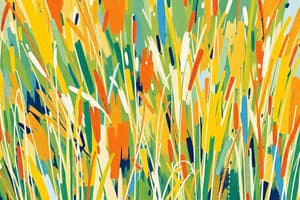Podcast
Questions and Answers
What is the primary difference between perennial and annual crops?
What is the primary difference between perennial and annual crops?
- Annual crops have deeper root systems compared to perennial crops.
- Annual crops help better in soil conservation compared to perennial crops.
- Perennial crops need to be replanted every year, while annual crops do not.
- Perennial crops live for more than two years, while annual crops complete their life cycle within a year. (correct)
Which benefit of perennial crops is primarily due to their extensive root systems?
Which benefit of perennial crops is primarily due to their extensive root systems?
- Market demand
- Soil conservation (correct)
- Yield variability
- Climate resilience
Which characteristic allows perennial crops to often require less water than annual crops?
Which characteristic allows perennial crops to often require less water than annual crops?
- Their shorter dormant periods
- Higher pest resistance
- Their slower growth rate
- Their deeper and more efficient root systems (correct)
Which of these is not an example of a perennial fruit crop?
Which of these is not an example of a perennial fruit crop?
Which challenge might growers of perennial crops face more frequently due to the longer lifespan of these crops?
Which challenge might growers of perennial crops face more frequently due to the longer lifespan of these crops?
Why might perennial crops be less appealing in terms of market demand compared to annual crops?
Why might perennial crops be less appealing in terms of market demand compared to annual crops?
Which of the following is a perennial vegetable crop?
Which of the following is a perennial vegetable crop?
Which is a direct benefit of growing perennial crops in terms of ecosystem services?
Which is a direct benefit of growing perennial crops in terms of ecosystem services?
Study Notes
Definition and Characteristics
- Perennial crops are crops that live for more than two years and typically do not need to be replanted every year.
- They have a longer lifespan compared to annual crops, which complete their life cycle within a year.
- Perennial crops often have a dormant period during the winter months, and then regrow in the spring.
Benefits
- Soil conservation: Perennial crops help reduce soil erosion and retain soil health due to their extensive root systems.
- Water efficiency: Perennial crops often require less water than annual crops, as their roots are deeper and more efficient at absorbing water.
- Biodiversity: Perennial crops can provide habitat for beneficial insects and microorganisms, promoting ecosystem services.
- Low maintenance: Perennial crops typically require less labor, fertilizer, and pesticide inputs compared to annual crops.
- Climate resilience: Perennial crops can be more resilient to extreme weather events, such as droughts and floods.
Examples of Perennial Crops
- Fruit crops: Apple, pear, peach, cherry, and berry bushes
- Nut crops: Almonds, walnuts, pecans, and hazelnuts
- Grain crops: Wheat, oats, and rye (although often grown as annuals, they can be perennial in certain conditions)
- Vegetable crops: Asparagus, rhubarb, and artichokes
- Forage crops: Alfalfa, clover, and perennial ryegrass
Challenges and Limitations
- Initial investment: Establishing a perennial crop often requires a higher initial investment compared to annual crops.
- Yield variability: Perennial crops can have variable yields from year to year, depending on factors like weather and pest pressure.
- Pest and disease management: Perennial crops can be more susceptible to pests and diseases due to their longer lifespan.
- Market demand: Perennial crops may not be as widely marketable as annual crops, due to factors like seasonality and storage requirements.
Definition and Characteristics
- Perennial crops have a lifespan of more than two years and do not need to be replanted every year.
- They have a longer lifespan compared to annual crops, which complete their life cycle within a year.
- Perennial crops often have a dormant period during winter and regrow in spring.
Benefits
- Perennial crops reduce soil erosion and retain soil health due to their extensive root systems.
- They require less water than annual crops, as their roots are deeper and more efficient at absorbing water.
- They provide habitat for beneficial insects and microorganisms, promoting ecosystem services.
- They typically require less labor, fertilizer, and pesticide inputs compared to annual crops.
- They are more resilient to extreme weather events, such as droughts and floods.
Examples of Perennial Crops
- Fruit crops include apple, pear, peach, cherry, and berry bushes.
- Nut crops include almonds, walnuts, pecans, and hazelnuts.
- Grain crops like wheat, oats, and rye can be perennial in certain conditions.
- Vegetable crops include asparagus, rhubarb, and artichokes.
- Forage crops include alfalfa, clover, and perennial ryegrass.
Challenges and Limitations
- Establishing a perennial crop requires a higher initial investment compared to annual crops.
- Perennial crops can have variable yields from year to year, depending on weather and pest pressure.
- They are more susceptible to pests and diseases due to their longer lifespan.
- Perennial crops may not be as widely marketable as annual crops, due to factors like seasonality and storage requirements.
Studying That Suits You
Use AI to generate personalized quizzes and flashcards to suit your learning preferences.
Description
Learn about the definition, characteristics, and benefits of perennial crops, including their impact on soil conservation and ecosystem health.




